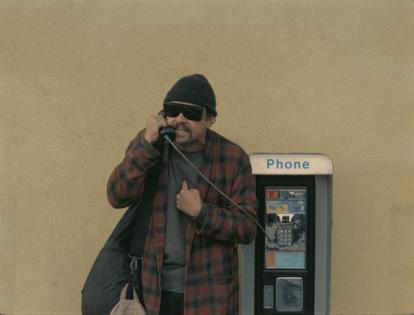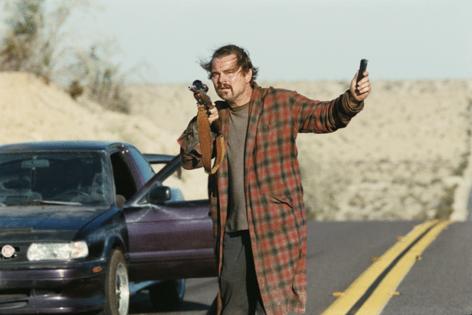Movie review: Incendiary, incisive 'One Battle After Another' is the film of the year
Published in Entertainment News
Legendary auteur Paul Thomas Anderson has made the film of the year with the incendiary, incisive and frequently quite funny “One Battle After Another,” which just happens to be a searing indictment of this particular moment in American history. Inspired by Thomas Pynchon’s 1990 novel “Vineland” (this is his second Pynchon adaptation, after 2014’s “Inherent Vice”), Anderson transplants the novel’s Reagan-era revolutionary story to present day, loosely utilizing the general narrative and themes, but making it entirely his own. It is a film that is both chillingly prescient and deeply present in this contemporary milieu.
“One Battle After Another” feels like it could be about today, tomorrow or yesterday in America’s timeline, rooted not necessarily in real events but events that feel like they could, or should, be real.
The film opens in an immigration detention camp, as a band of left-wing political militants known as the French 75 infiltrate the facility to liberate the detained, and detain the military overseers. Enchanting rebel leader Perfidia Beverly Hills (Teyana Taylor) locates Col. Stephen Lockjaw (Sean Penn) and relishes sexually humiliating him, something that he also relishes. It’s a dynamic of pleasure and violence that locks the pair into a long-standing exchange of sexual power that will ultimately lead to the dissolution of the French 75, and years of persecution for its members.
Perfidia’s partner is Pat (Leonardo DiCaprio), aka the Rocket Man, the French 75 explosives guy. She becomes pregnant, and when the baby is born, she beats a hasty retreat from motherhood, having chosen the right father for her child. You can’t say Pat wasn’t warned, as Perfidia’s mother tells him, “she’s a runner and you’re a stump.” No man could match her fiery and footloose energy.
Her story, a whirling dervish of montage, makes up the first act of the film, in which she runs risky operations while romancing her respective political paramours, betrays her comrades and disappears into thin air, leaving Pat and her baby girl to retreat into witness protection in the Northern California sanctuary city of Baktan Cross. Her daughter, renamed Willa (Chase Infiniti), grows into normal teenager who trains in martial arts and wants to hang out with her friends, chafing against the paranoia of her single father, now going by Bob, who won’t allow her to have a cellphone, and passes his time smoking weed in their remote cabin.
Bob’s is not garden-variety parental paranoia, though, because Lockjaw returns, and the French 75 have to knock the rust off their revolutionary skills in order to protect Willa from the maws of state-sanctioned violence that Lockjaw has mobilized in order to pluck the baby bird from her nest. Bob might be a washed-up old stoner, but he earned his stripes for a reason, and he will stop at nothing to save his daughter.
“One Battle After Another” is a tale of epic scope about the many shadowy networks and secretive factions that undergird our society while hiding in plain sight. He introduces not just the French 75, but an underground railroad for Latino immigrants run by Sensei Sergio (Benicio del Toro), a powerful white supremacist secret society, a racist backwoods militia, a convent of cannabis-cultivating nuns, all pulling the strings behind the scenes of American life. But Anderson balances the sprawling, conspiracy-minded aspects of this yarn with the intimate father-daughter story, which is the heart of the matter.
He reflects that blend of epic and intimate in the film’s style, working with cinematographer Michael Bauman. The film was shot on glorious VistaVision, a higher-resolution, widescreen variant of 35mm film, imbued with a thrillingly kinetic sense of movement — the camera follows closely behind our characters as they move swiftly through space, and sweeps over stunning vistas of burning cities and monumental land masses. A climatic car chase is hypnotically rendered, lulling, trancelike before a stunning finale. Even the aerial shots have the jiggle and quiver of a helicopter, not a drone. That something so enormously scaled is clearly handcrafted is deeply moving.
Jonny Greenwood’s score moves between soaring strings and dissonant piano keys, alternately soothing and anxious; a few pieces composed by Jon Brion add an ambient layer of wistfulness.
At the center of it all is DiCaprio as a bumbling dad, clad in an old robe and Solar Shields, and the performance he delivers is a harrowing, harried hoot, playing the hysterical foil to del Toro’s smooth sensei. The two men have different styles but the same goal: to keep their families intact.
“One Battle After Another” isn’t just an explosive revolutionary text but a story of fatherhood — the values we pass down to the next generation, and how we care for them, with love and generosity; with fear, anxiety, a little bit of hope, and above all, a whole lot of faith.
———
'ONE BATTLE AFTER ANOTHER'
4 stars (out of 4)
MPA rating: R (for pervasive language, violence, sexual content, and drug use)
Running time: 2:42
How to watch: In theaters Sept. 26
———
©2025 Tribune Content Agency, LLC
















Comments